Black Radio Collections
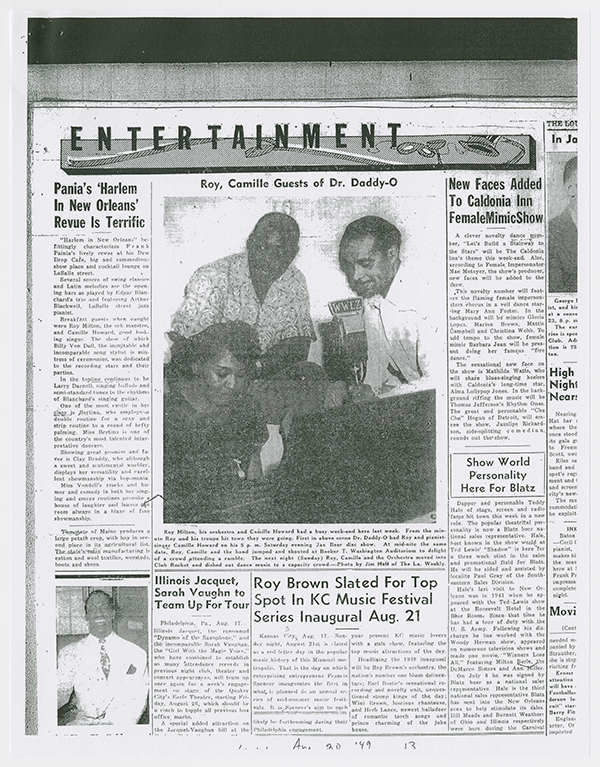 The collection consists primarily of interviews and articles regarding radio stations and music in New Orleans, including information about the first African American deejays in New Orleans and the Poppa Stoppa radio program.
The collection consists primarily of interviews and articles regarding radio stations and music in New Orleans, including information about the first African American deejays in New Orleans and the Poppa Stoppa radio program.
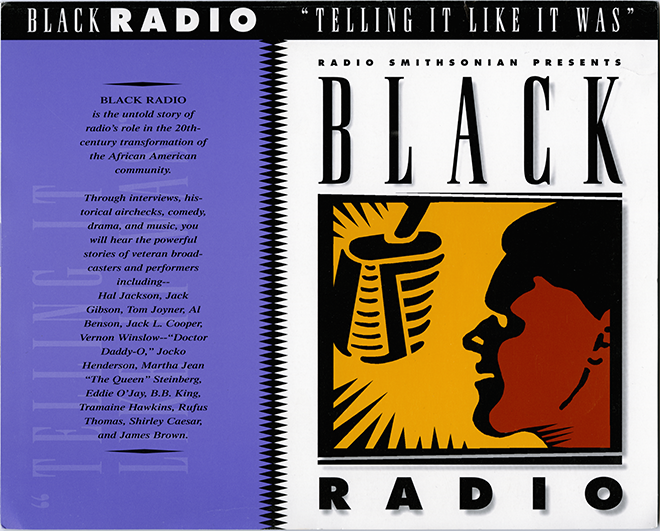 Production materials documenting Smithsonian's thirteen-part program on the role of radio in transforming the African American community in the twentieth century. The program was produced in 1996 by Jacquie Gales Webb for Smithsonian Productions, with assistance from the AAAMC. The collection contains over 400 hours of interviews and historical aircheck tapes in addition to articles, research files, program scripts, and transcripts. The audio interviews feature conversations with over 150 well-known disc jockeys, radio professionals, record company executives, journalists, and scholars. The historical airchecks include station identifications and jingles, radio interviews with prominent Black figures, coverage of historical events, and programs highlighting or influenced by the contributions of Black performers, disc jockeys, and other important persons in radio.
Production materials documenting Smithsonian's thirteen-part program on the role of radio in transforming the African American community in the twentieth century. The program was produced in 1996 by Jacquie Gales Webb for Smithsonian Productions, with assistance from the AAAMC. The collection contains over 400 hours of interviews and historical aircheck tapes in addition to articles, research files, program scripts, and transcripts. The audio interviews feature conversations with over 150 well-known disc jockeys, radio professionals, record company executives, journalists, and scholars. The historical airchecks include station identifications and jingles, radio interviews with prominent Black figures, coverage of historical events, and programs highlighting or influenced by the contributions of Black performers, disc jockeys, and other important persons in radio.
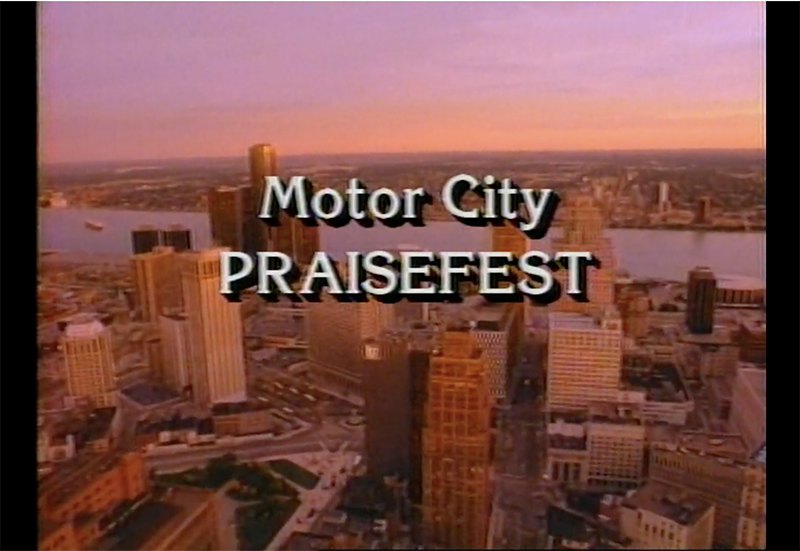 The Deborah Smith Pollard collection includes more than 200 gospel music magazines and other publications from the 1980s to 2000s. The collection also includes Pollard's gospel music television specials, over 50 interviews she conducted with gospel artists and industry figures, airchecks of Pollard's radio program "Strong Inspirations" and radio programs hosted by other announcers.
The Deborah Smith Pollard collection includes more than 200 gospel music magazines and other publications from the 1980s to 2000s. The collection also includes Pollard's gospel music television specials, over 50 interviews she conducted with gospel artists and industry figures, airchecks of Pollard's radio program "Strong Inspirations" and radio programs hosted by other announcers.
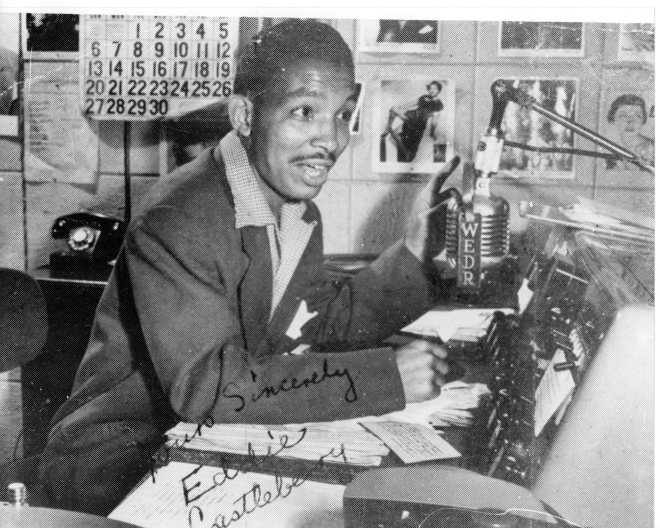 The collection consists of personal papers, photographs, and a video documenting the career Ed Castleberry, a pioneering black radio disc jockey and newscaster.
The collection consists of personal papers, photographs, and a video documenting the career Ed Castleberry, a pioneering black radio disc jockey and newscaster.
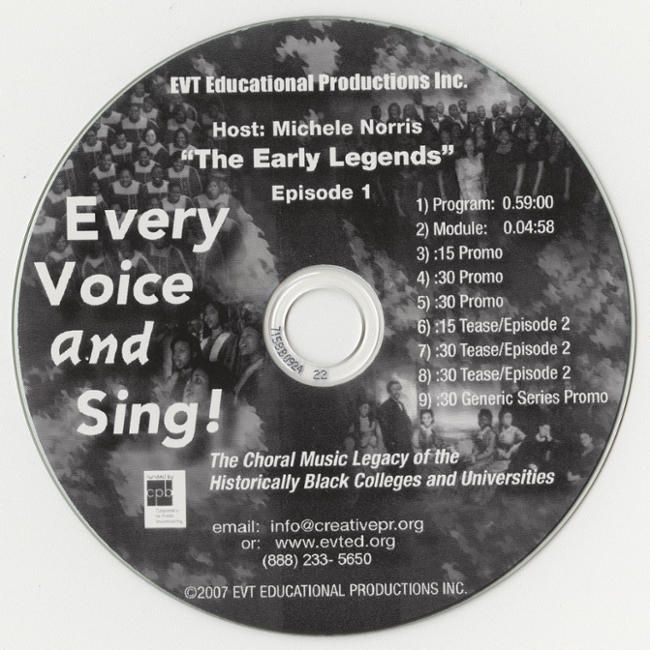 Every Voice and Sing: The Choral Music Legacy of the Historically Black Colleges and Universities is a 5-part series on Black choral music that explores the social/political context of the Civil War/Reconstruction era that brought about the formation of these Historically Black Colleges and Universities and their amazing Singing Groups. The project is collaborative production of EVT Educational Productions, Inc. and JAZZ88.3FM WBGO Radio of Newark, New Jersey. The series was broadcast by over 240 public radio stations.
Every Voice and Sing: The Choral Music Legacy of the Historically Black Colleges and Universities is a 5-part series on Black choral music that explores the social/political context of the Civil War/Reconstruction era that brought about the formation of these Historically Black Colleges and Universities and their amazing Singing Groups. The project is collaborative production of EVT Educational Productions, Inc. and JAZZ88.3FM WBGO Radio of Newark, New Jersey. The series was broadcast by over 240 public radio stations.
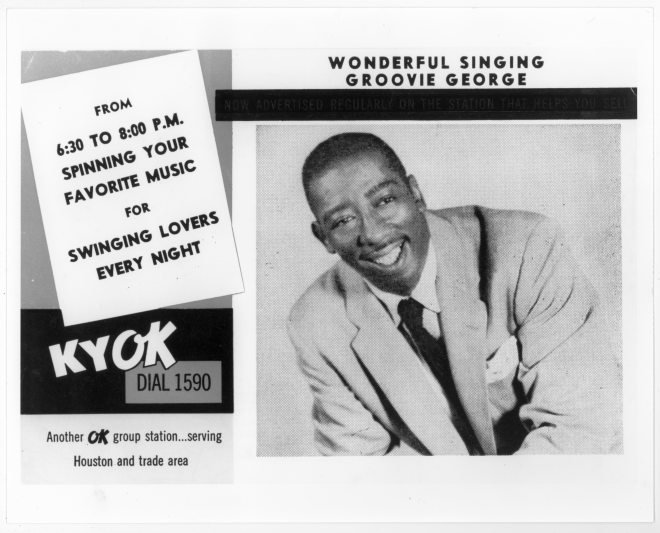 Collection consists of black and white photographs from the 1950s through the early 1980s related to KYOK in Houston. Including are images documenting the activities of KYOK's deejays in the studio and surrounding communities, particularly in connection with listener contests and station-sponsored events such as dances and the "We Love You" concert. Also included are photographs of KYOK publicity materials and publicity photographs of many of the rhythm and blues artists, jazz, and blues artists featured on the station.
Collection consists of black and white photographs from the 1950s through the early 1980s related to KYOK in Houston. Including are images documenting the activities of KYOK's deejays in the studio and surrounding communities, particularly in connection with listener contests and station-sponsored events such as dances and the "We Love You" concert. Also included are photographs of KYOK publicity materials and publicity photographs of many of the rhythm and blues artists, jazz, and blues artists featured on the station.
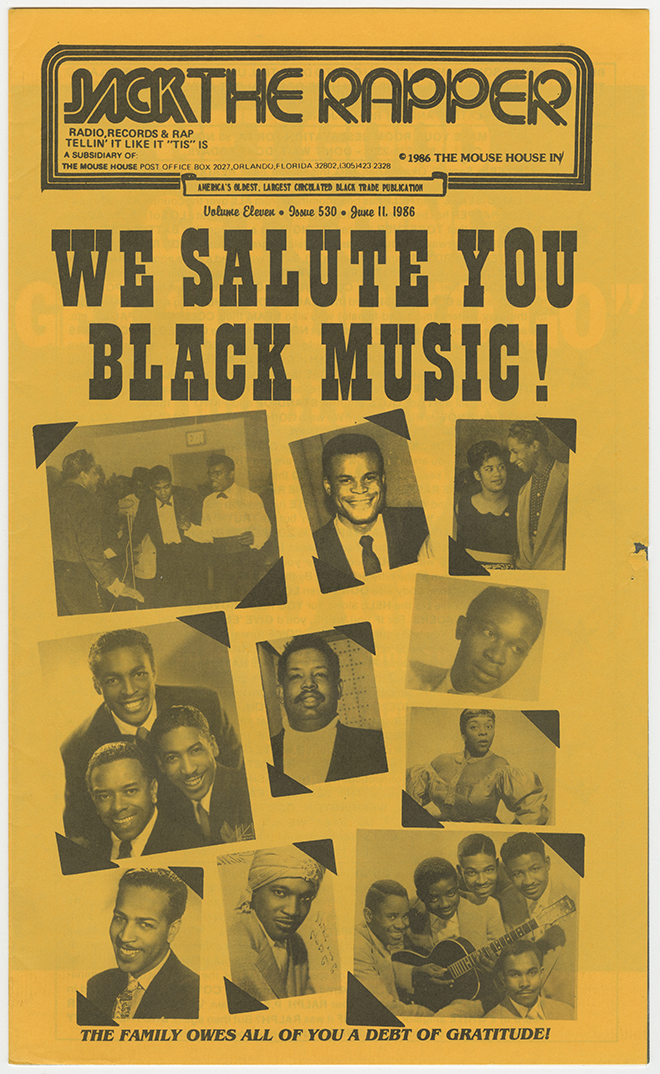 A collection documenting the career of Black radio pioneer "Jockey Jack" Gibson. Includes a complete set of Mello Yello, the oldest black trade magazine targeted to Black radio and the music industry, published by Gibson from 1976-1996. Also included are original air-check tapes, an unreleased video documentary about Gibson, audio and video interviews with Jack Gibson and various colleagues, souvenir programs from "The Family Affair" (the oldest black radio and black music convention hosted by Jack Gibson), and photographs of radio personalities and rhythm & blues artists.
A collection documenting the career of Black radio pioneer "Jockey Jack" Gibson. Includes a complete set of Mello Yello, the oldest black trade magazine targeted to Black radio and the music industry, published by Gibson from 1976-1996. Also included are original air-check tapes, an unreleased video documentary about Gibson, audio and video interviews with Jack Gibson and various colleagues, souvenir programs from "The Family Affair" (the oldest black radio and black music convention hosted by Jack Gibson), and photographs of radio personalities and rhythm & blues artists.
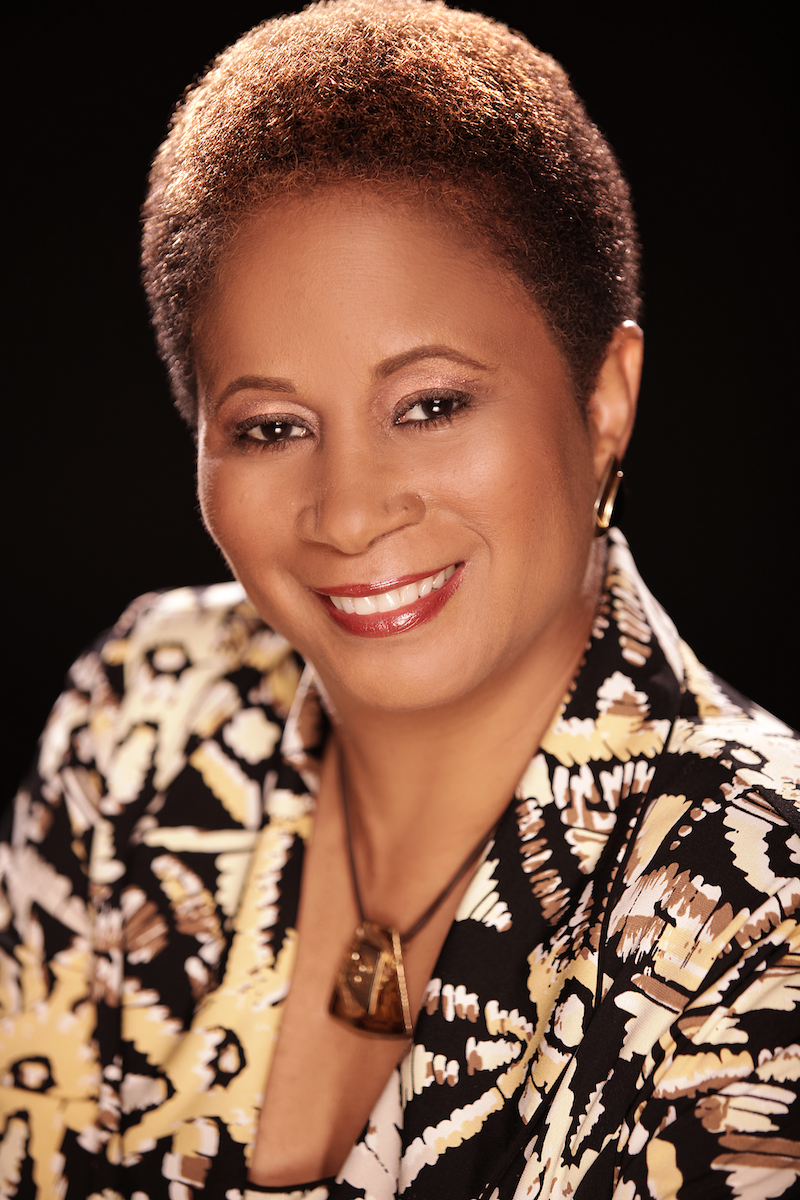 Materials documenting Gales Webb's career as an award-winning producer and host of "Sunday Afternoon Gospel Music Program" on 96.3 WHUR in Washington, DC. Includes interviews and production materials used in the public radio series Remembering Slavery and Jazz Singers, the television documentary Melodies from Heaven, the video for the Smithsonian Institution's exhibit Beyond Category: The Music of Duke Ellington, and her materials related to SC 39: Black Radio: Telling it Like it Was (a radio series also produced by Gales Webb).
Materials documenting Gales Webb's career as an award-winning producer and host of "Sunday Afternoon Gospel Music Program" on 96.3 WHUR in Washington, DC. Includes interviews and production materials used in the public radio series Remembering Slavery and Jazz Singers, the television documentary Melodies from Heaven, the video for the Smithsonian Institution's exhibit Beyond Category: The Music of Duke Ellington, and her materials related to SC 39: Black Radio: Telling it Like it Was (a radio series also produced by Gales Webb).
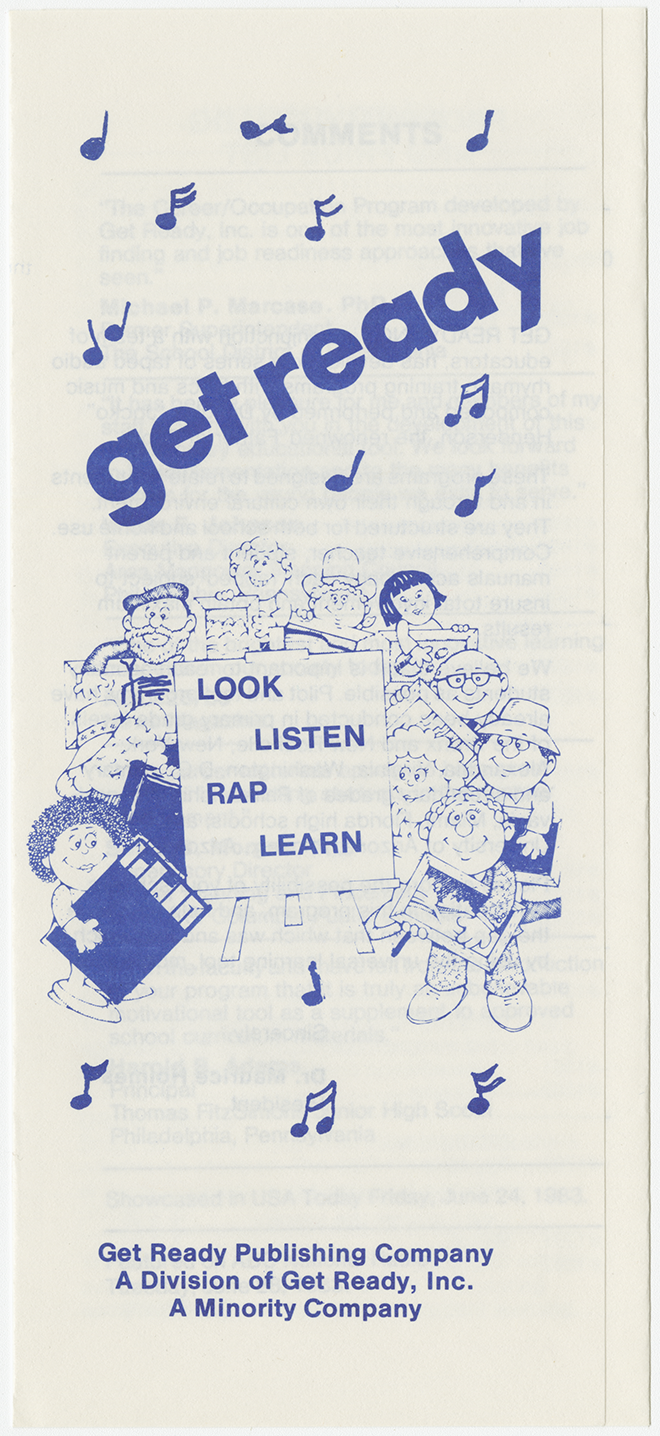 Doug "Jocko" Henderson was a pioneering "rapping" deejay primarily associated with Philadelphia radio station WDAS in the 1970s. Collection primarily documents Henderson's Get Ready company, which published materials to be used in schools to teach American history, spelling, and the dangers of drug abuse using rap lyrics. Also included is material documenting Henderson's bid for a seat in the United States House of Representatives in Pennsylvania. Materials include audiocassettes, teaching manuals, correspondence, photographs, business cards, press clippings, flyers, and other memorabilia.
Doug "Jocko" Henderson was a pioneering "rapping" deejay primarily associated with Philadelphia radio station WDAS in the 1970s. Collection primarily documents Henderson's Get Ready company, which published materials to be used in schools to teach American history, spelling, and the dangers of drug abuse using rap lyrics. Also included is material documenting Henderson's bid for a seat in the United States House of Representatives in Pennsylvania. Materials include audiocassettes, teaching manuals, correspondence, photographs, business cards, press clippings, flyers, and other memorabilia.
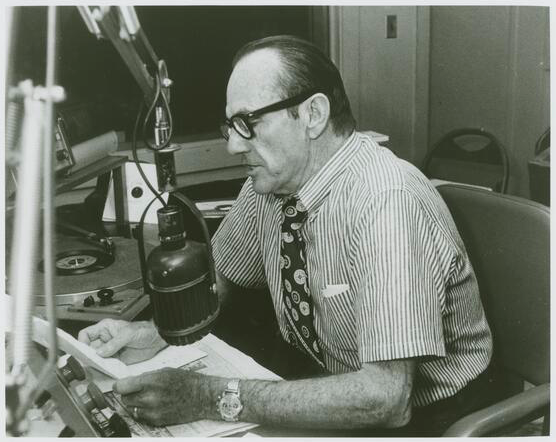 Clippings, photographs, and audiocassette copies of airchecks compiled as "Sounds of the Fifties & Sixties" - radio programs as broadcast by well known WLAC deejay John R.
Clippings, photographs, and audiocassette copies of airchecks compiled as "Sounds of the Fifties & Sixties" - radio programs as broadcast by well known WLAC deejay John R.
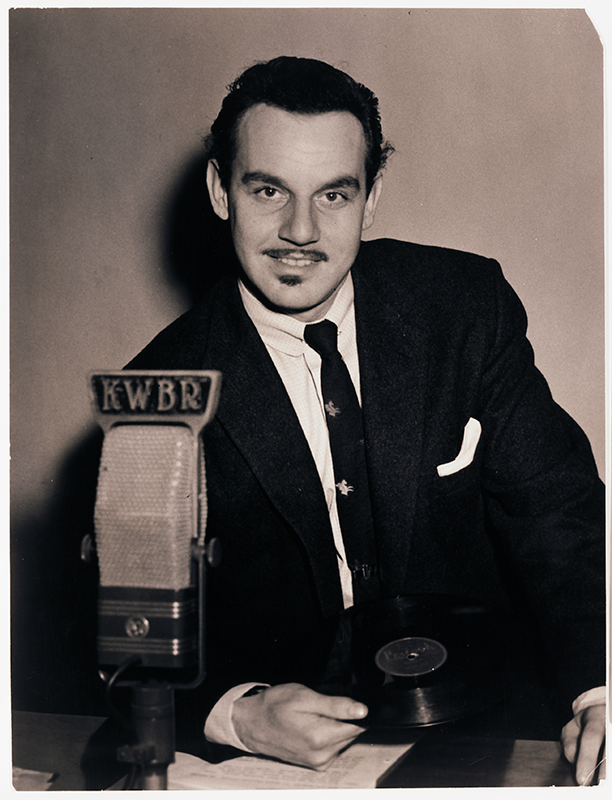 Approximately 800 radio aircheck tapes of radio programs of black popular music (live and prerecorded), hosted by Johnny Otis, and featuring live interviews with blues and rhythm & blues artists from the 1940s, 1950s, and 1960s. Artists interviewed include Little Esther Phillips, Al Frazier, Mary Wells, Zola Taylor, the Coasters, Horace Silver, the Robins, Etta James, Big Jay McNeely, Bobby Day, Bumps Blackwell, Pee Wee Crayton, Jimmy McCracklin, and Joe Liggins. Also included are photographs, memorabilia, books, and compact discs.
Approximately 800 radio aircheck tapes of radio programs of black popular music (live and prerecorded), hosted by Johnny Otis, and featuring live interviews with blues and rhythm & blues artists from the 1940s, 1950s, and 1960s. Artists interviewed include Little Esther Phillips, Al Frazier, Mary Wells, Zola Taylor, the Coasters, Horace Silver, the Robins, Etta James, Big Jay McNeely, Bobby Day, Bumps Blackwell, Pee Wee Crayton, Jimmy McCracklin, and Joe Liggins. Also included are photographs, memorabilia, books, and compact discs.
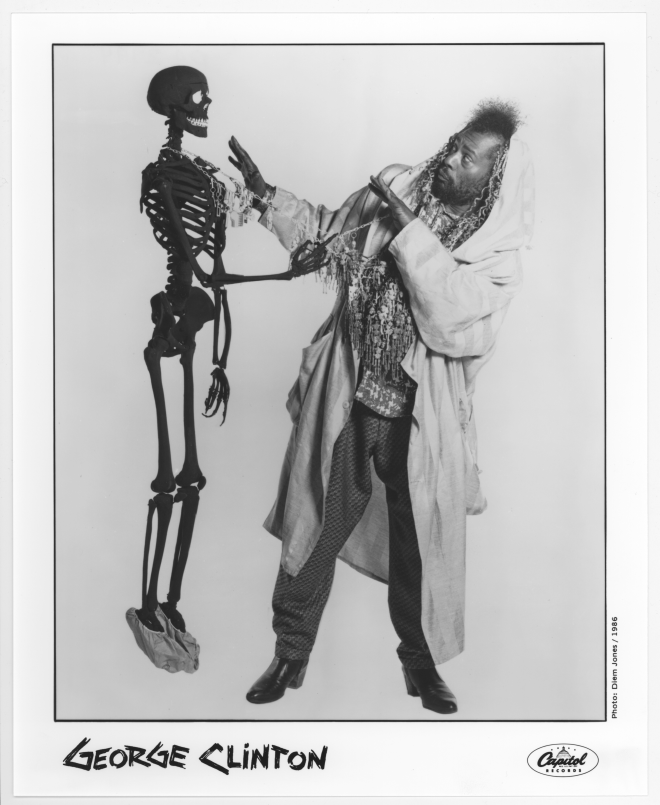 Collection consists primarily of interview transcripts, program transcripts, and artist publicity materials used in the production of the Westwood One Radio programs Special Edition, That's Country Music, Rock Chronicles, My Top Ten, and History of Rock 'n Roll. It also contains materials from various specials including programs on Elvis Presley, Jimi Hendrix, and the Rolling Stones.
Collection consists primarily of interview transcripts, program transcripts, and artist publicity materials used in the production of the Westwood One Radio programs Special Edition, That's Country Music, Rock Chronicles, My Top Ten, and History of Rock 'n Roll. It also contains materials from various specials including programs on Elvis Presley, Jimi Hendrix, and the Rolling Stones.
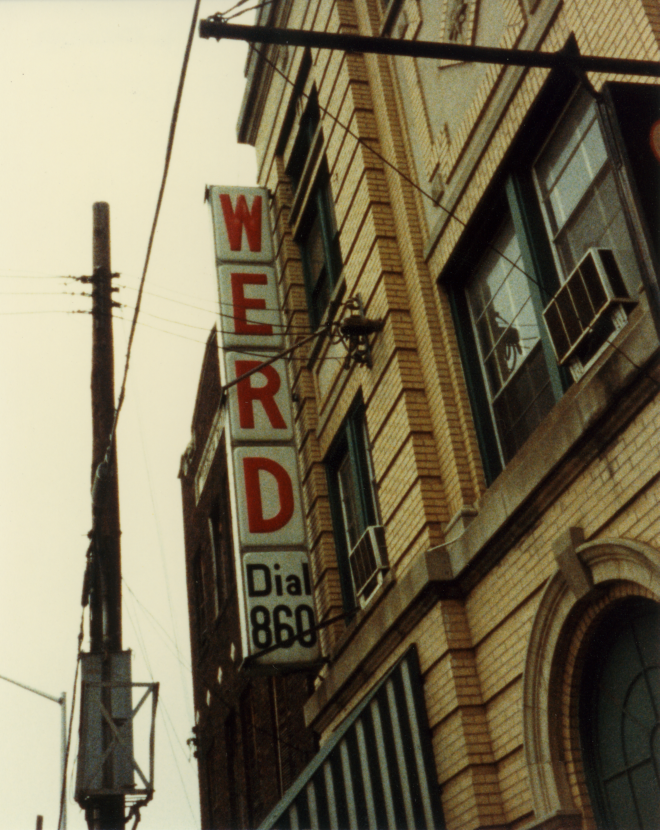 Collection consists of materials related to Lewis's work at the WERD radio station in the 1950s and '60s. Founded by Jesse B. Blayton, Sr. in October 1949 in Atlanta, Georgia, WERD was the first black owned and operated radio station in the United States. The collection materials comprise 7 black and white and 7 color photographs documenting WERD's early history. Content includes the exterior of the WERD studio building, publications related to WERD such as photographs of an issue of The Printed WERD, and a portrait of J.B. Blayton Sr.
Collection consists of materials related to Lewis's work at the WERD radio station in the 1950s and '60s. Founded by Jesse B. Blayton, Sr. in October 1949 in Atlanta, Georgia, WERD was the first black owned and operated radio station in the United States. The collection materials comprise 7 black and white and 7 color photographs documenting WERD's early history. Content includes the exterior of the WERD studio building, publications related to WERD such as photographs of an issue of The Printed WERD, and a portrait of J.B. Blayton Sr.
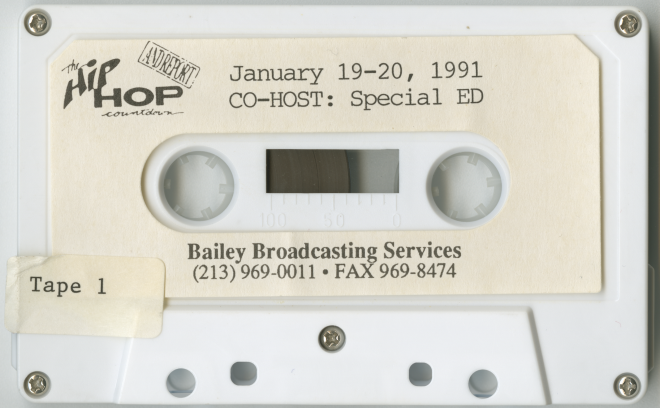 The collection consists primarily of audio tapes of two radio programs produced by Bailey Broadcasting Services: The Hip Hop Countdown & Report (1991-1998) and RadioScope: The Entertainment Magazine of the Air (1990-1996). Press releases for RadioScope broadcasts are also included.
The collection consists primarily of audio tapes of two radio programs produced by Bailey Broadcasting Services: The Hip Hop Countdown & Report (1991-1998) and RadioScope: The Entertainment Magazine of the Air (1990-1996). Press releases for RadioScope broadcasts are also included.
Materials compiled during the production of the Rhythm & Blues Foundation's Let the Good Times Roll, a series of hour-long radio programs hosted by Jerry "The Iceman" Butler and distributed by National Public Radio. Included are photographs, transcripts of interviews with various musicians featured on the shows, publicity materials, and a complete set of the radio programs on compact disc.
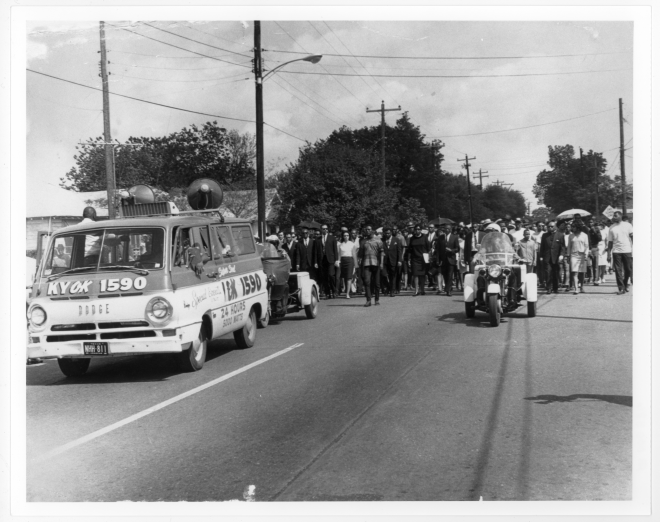 Collection consists primarily of materials related to Roberts's work at KYOK-AM in the 1960s and '70s including images of KYOK sponsored events such as the "We Love You" concert and associated publicity materials, a beauty pageant, radio contests, and on-site broadcasts throughout Houston. Also included are photographs of KYOK radio personalities and staff as well as candid and publicity photographs of visiting R&B artists.
Collection consists primarily of materials related to Roberts's work at KYOK-AM in the 1960s and '70s including images of KYOK sponsored events such as the "We Love You" concert and associated publicity materials, a beauty pageant, radio contests, and on-site broadcasts throughout Houston. Also included are photographs of KYOK radio personalities and staff as well as candid and publicity photographs of visiting R&B artists.
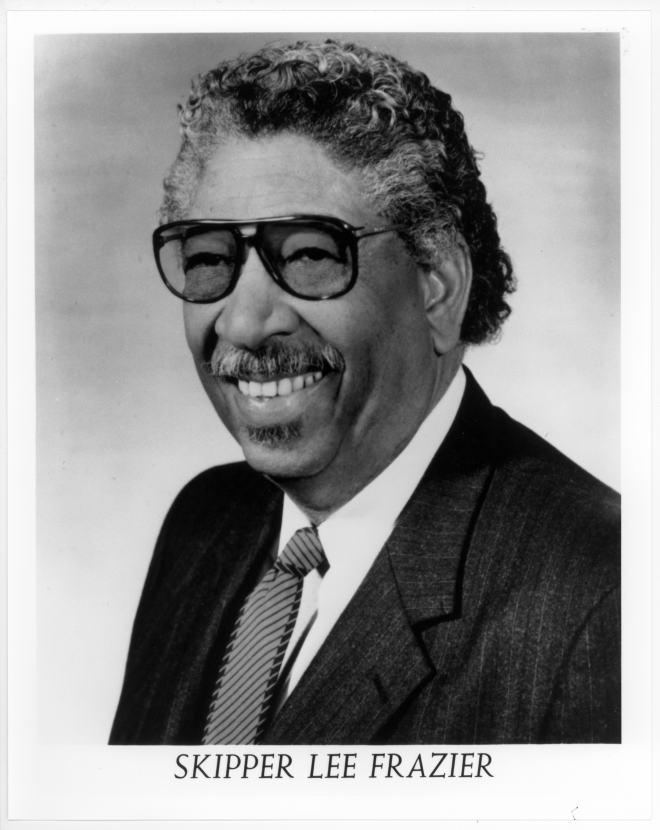 Photographs documenting the career of Houston deejay Skipper Lee Frazier, copied from his personal collection. Additional photo descriptions with biographical information transcribed from an interview with Frazier are available in accession folder. The collection consists of 12 b&w photographs with negatives primarily documenting Skipper Lee Frazier's activities in connection with KCOH in Houston during the 1970s and '80s.
Photographs documenting the career of Houston deejay Skipper Lee Frazier, copied from his personal collection. Additional photo descriptions with biographical information transcribed from an interview with Frazier are available in accession folder. The collection consists of 12 b&w photographs with negatives primarily documenting Skipper Lee Frazier's activities in connection with KCOH in Houston during the 1970s and '80s.
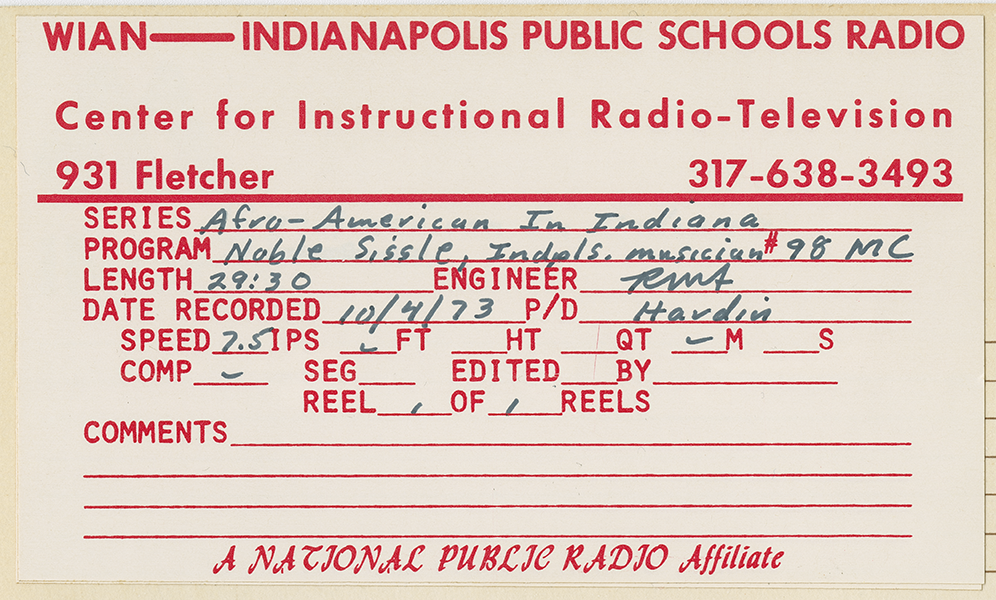 Audio recordings of taped radio show episodes, primarily from the series The Afro-American in Indiana, but also including the additional programs Reflections in Black and Black Heritage, as well as a radio special and recordings from a NAACP convention. The radio shows, hosted by Fr. Boniface Hardin, featured multiple high-profile guests. The episode topics includes sports, music, education, historiography, slavery, the American Civil War, Reconstruction, segregation, the Indiana Constitution, the United States Constitution, church, religion, the NAACP, WWI, WWII, medicine, black businesses, the Institute of Afro American Studies, prison, labor history, and more.
Audio recordings of taped radio show episodes, primarily from the series The Afro-American in Indiana, but also including the additional programs Reflections in Black and Black Heritage, as well as a radio special and recordings from a NAACP convention. The radio shows, hosted by Fr. Boniface Hardin, featured multiple high-profile guests. The episode topics includes sports, music, education, historiography, slavery, the American Civil War, Reconstruction, segregation, the Indiana Constitution, the United States Constitution, church, religion, the NAACP, WWI, WWII, medicine, black businesses, the Institute of Afro American Studies, prison, labor history, and more.
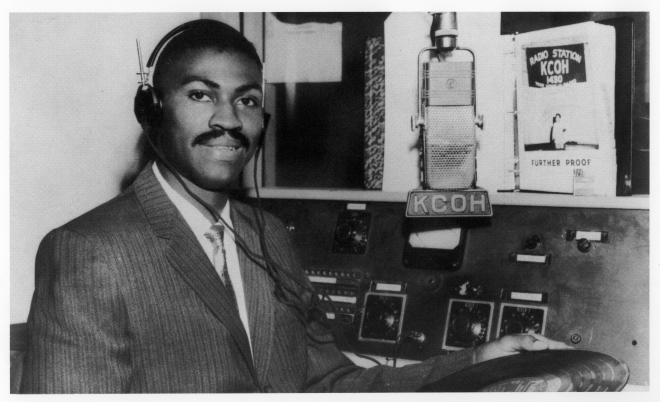 Black radio photograph collection documenting events and personnel, including photos with rhythm and blues musicians, at Houston station KCOH in the 1960s and 1970s. Photographs were copied from the personal collection of Gardner. Accompanied by a transcription of an interview with Gardner which includes descriptions of each photograph.
Black radio photograph collection documenting events and personnel, including photos with rhythm and blues musicians, at Houston station KCOH in the 1960s and 1970s. Photographs were copied from the personal collection of Gardner. Accompanied by a transcription of an interview with Gardner which includes descriptions of each photograph.
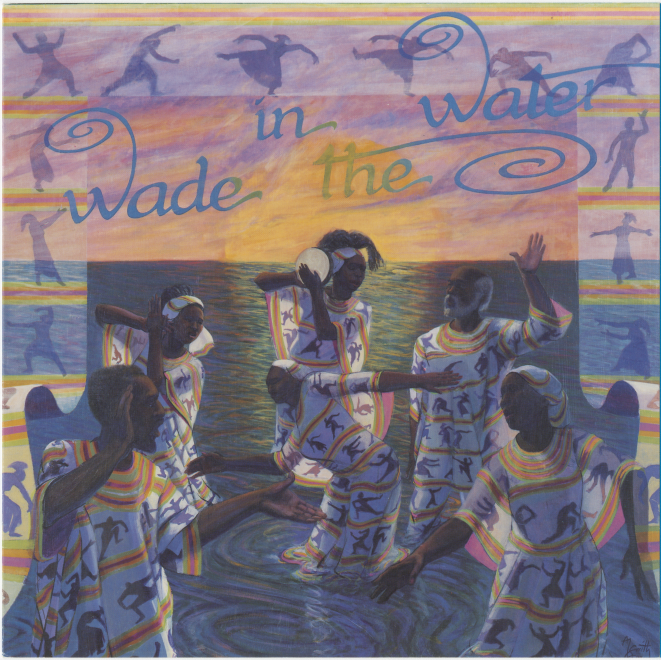 A 26-part series on gospel music conceived and hosted by Bernice Johnson Reagon and produced by National Public Radio. The series is accompanied by a curriculum guide.
A 26-part series on gospel music conceived and hosted by Bernice Johnson Reagon and produced by National Public Radio. The series is accompanied by a curriculum guide.
Over 200 radio programs on black popular music from the 1970s and 1980s produced by Karen Shearer Productions for Westwood One. The programs include narration, interviews and recordings by artists such as the O'Jays, Tina Turner, Bobby Bland, Curtis Mayfield, Natalie Cole, B. B. King, Little Richard, Smokey Robinson, Stevie Wonder, Gladys Knight and the Pips, Earth, Wind & Fire, Kool & the Gang, War, Patti LaBelle, the Staple Singers, the Spinners, Isaac Hayes, Diana Ross, the Jacksons, Peabo Bryson, the Commodores, Ashford & Simpson, Larry Graham, Isley Brothers, Barry White, George Benson, Aretha Franklin, the Pointer Sisters, Patrice Rushen, the Dells, Al Green, the Chi-Lites, Parliament-Funkadelic, Deniece Williams, the Ohio Players, Jerry Butler, Johnnie Taylor, the Four Tops, Teddy Pendergrass, Herbie Hancock, Booker T. and the MGs, Quincy Jones, the Temptations, Donna Summer, Zapp, and Luther Vandross. Transcriptions are available for some interviews and programs. This collection is jointly held with the Archives of Traditional Music at Indiana University.
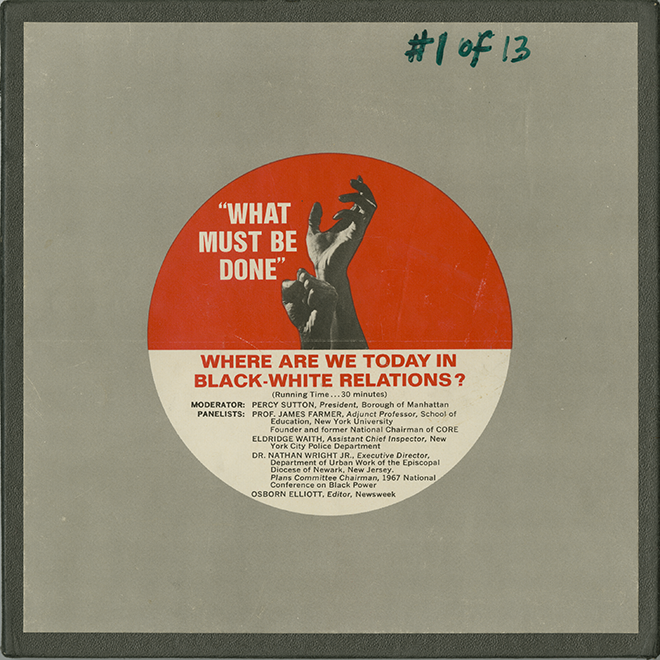 These materials comprise a thirteen-part radio series of public service broadcasts produced by Sam Chase for WLIB radio in New York in cooperation with Newsweek Magazine.
These materials comprise a thirteen-part radio series of public service broadcasts produced by Sam Chase for WLIB radio in New York in cooperation with Newsweek Magazine.
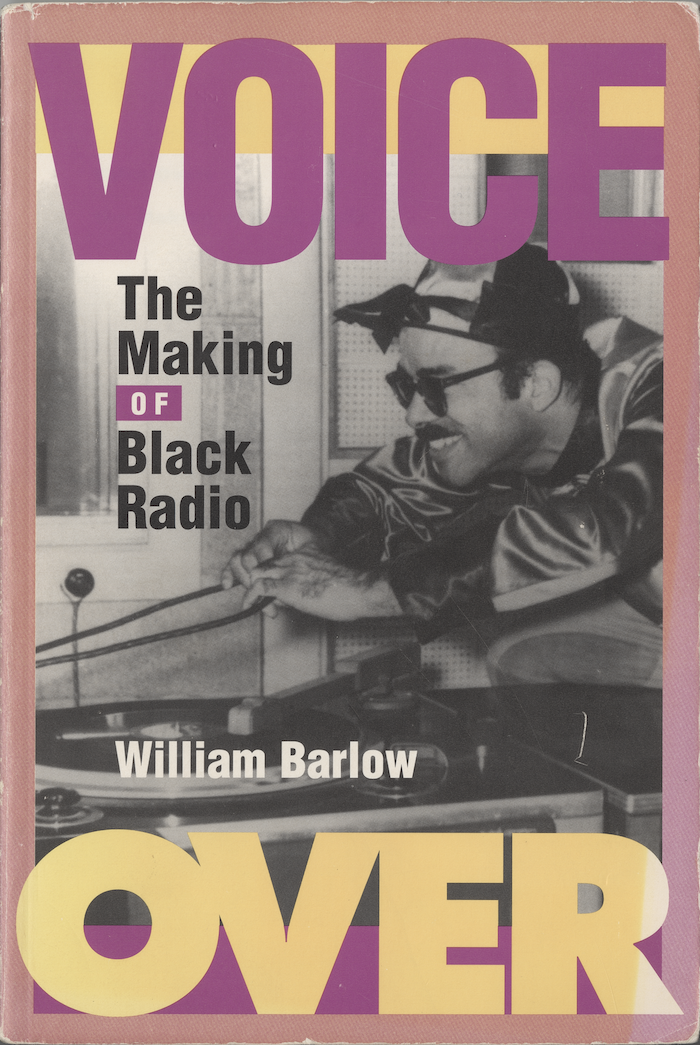 Personal papers related primarily to Black radio, including press clippings, published and unpublished articles, and other research materials used by Barlow for his monograph Voice Over: The Making of Black Radio (Temple University Press, 1999). Also included are Barlow's interviews with various blues artists and some recorded performances, collected during the course of research for his book "Looking Up at Down": The Emergence of Blues Culture (Temple University Press, 1989).
Personal papers related primarily to Black radio, including press clippings, published and unpublished articles, and other research materials used by Barlow for his monograph Voice Over: The Making of Black Radio (Temple University Press, 1999). Also included are Barlow's interviews with various blues artists and some recorded performances, collected during the course of research for his book "Looking Up at Down": The Emergence of Blues Culture (Temple University Press, 1989).
